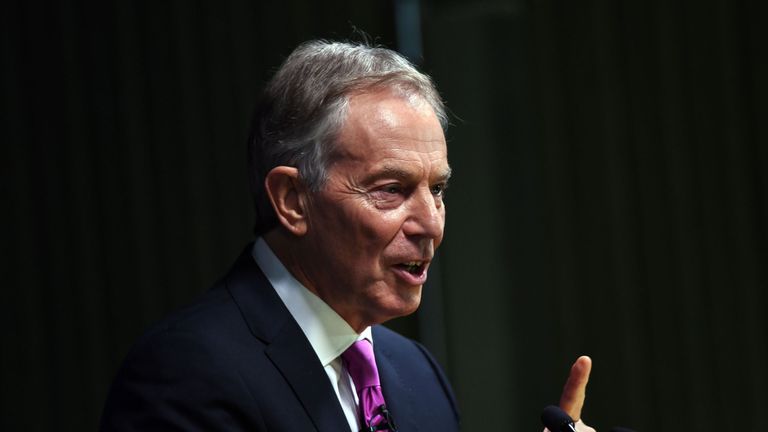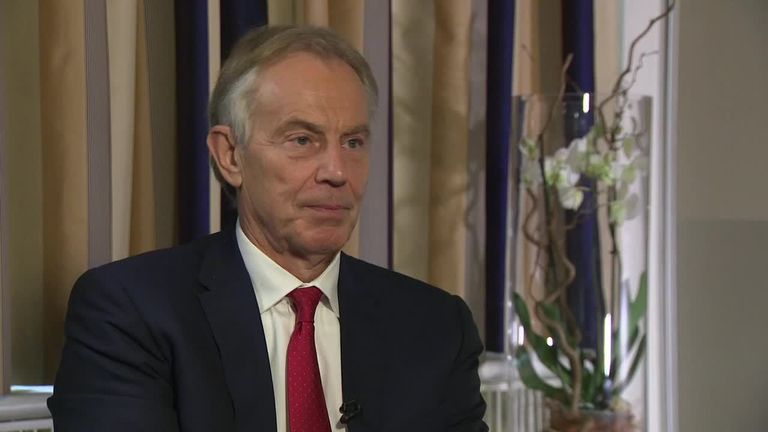Why Tony Blair's Brexit argument doesn't stand up
The former PM feels strongly about Brexit, and is turning his attention on convincing Europe to persuade Britain not to leave.
Monday 5 March 2018 19:18, UK
So Tony Blair has made yet another intervention on Brexit.
That sentence alone will be enough for many of you reading this to click away, such is the division on Brexit and the baggage Mr Blair carries.
But read on if you can, because this time, Mr Blair's Brexit message is different.
It's not directed at Britain but at the political class in the rest of Europe; the Eurocrats who run Brussels (who Mr Blair knows well) and the leaders of the remaining members of the EU.
Rather than telling us Brits why he thinks Brexit is so damaging, he has turned his attention to the EU - telling them why it'll hurt them and how they can persuade us not to leave.
:: Blair: Now a 50% chance Brexit won't happen
His argument to them goes like this: Brexit will harm you terribly too; it will hit your economies, it will diminish your global clout, you'll be weaker just at a time when America becomes unreliable and China rises.
If you are upset about the UK leaving the EU (and they are) then do something about it, he says.
Reform now, urgently and properly, and you will persuade the Brits to have a rethink and stay, he argues.
Hang on, you're thinking. Didn't David Cameron try that before the referendum, and fail? The reforms he secured from the EU were not enough to persuade Brits to vote 'in'.
Well, Mr Blair says: things are different now.
They didn't reform then, but they would now, if they thought it might mean we'd change our minds and stay.
At the core of his argument is immigration, which he thinks was the principle reason the Brexit vote prevailed.
British anxieties over immigration are, he says, not unique to the UK. Across Europe from France to Germany to Italy to Austria, he points out, there are increasing concerns about immigration.
He says that immigration anxiety and the populist parties it fuels is 'manifestly convulsing the whole of European politics'.
He's right that politics has polarised and fragmented in pretty much every EU country.
It is a phenomenon that's gathered pace in the past two years: Le Pen in France, the AfD in Germany, the Five Star Movement and the League in Italy, Wilders in the Netherlands. All are Eurosceptic and all have firmly placed themselves on the political map.
The centrist and pro-EU liberals such as Macron, Merkel and Rutte prevailed in their respective recent elections, but not because the Eurosceptic populists failed.
On the contrary - the centrists survived in spite of significant gains by Eurosceptic populist parties. They survived because they mimicked some of the populists' policies and they won because a critical proportion of voters were afraid to vote far-right.
Mr Blair argues that the centrists in power in Europe now know that things need to be done to tackle the problems around immigration. And so, he says, now's the time for deep EU-wide reform.
Cameron failed in his reform quest because he tried too soon and because few in the political class (including Mr Blair) actually believed Brexit would happen.
But I think Mr Blair's argument has holes.
Will the EU really reform? I doubt it.
After all the close runs in elections across Europe last year, the 'establishment' governments and, crucially, the likes of Jean-Claude Junker in Brussels simply patted themselves on the back and declared the 'wind back in the EU sails'.
It isn't, and the coalition nightmare in Germany and the Italian election prove that.
And what about Mr Blair's assertion that immigration was the principle driver for Brexit? It was a big factor, no doubt. But the principle factor?
Ideology was a huge part of it. There's nothing reform could do about that. Brussels' perceived control over us played heavy too, as did a mistrust of politics in general.
Mr Blair insists that he's not calling for a unilateral decision to stop Brexit. He thinks politics, pragmatism and people power, in the form of another vote, will change things.
There's one last problem with Mr Blair's argument: it will fall on plenty of deaf ears, such is the baggage he carries.
"You're tainted," I said to him.
"Brexit is a divisive issue. Some people will like what I say on Brexit, some will hate it." he said. "People may be bored to hell about it but I am afraid it matters so much to the future of this country."








